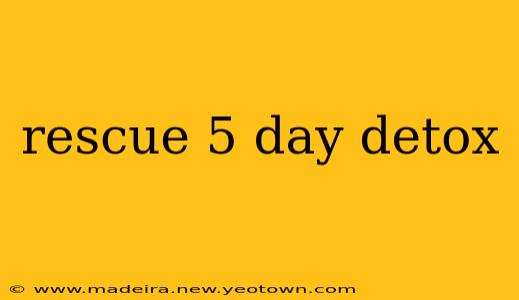Rescue 5-Day Detox: A Journey to Revitalization (Or, Is It?)
Let's be honest, the promise of a quick fix, a magical five-day cleanse to wash away all our dietary sins and leave us feeling reborn, is incredibly tempting. Enter the "Rescue 5-Day Detox," a program (or perhaps a multitude of programs marketed under that name) that promises just that. But before you jump in, let's unpack what a five-day detox really entails, and whether it lives up to the hype. This isn't a sponsored post; it's a realistic look at the claims, the potential benefits, and the critical considerations involved.
My own journey with the concept of detoxes began with a feeling of overwhelm. My diet had been…less than stellar. I craved a reset, a way to feel lighter and more energetic. The promise of a "Rescue 5-Day Detox" felt like an answer. But what I discovered was far more nuanced than the flashy marketing suggested.
What is a 5-Day Detox, Really?
A "5-Day Detox," in its purest form, usually aims to temporarily improve your overall well-being by reducing the intake of processed foods, alcohol, and caffeine, while increasing the consumption of fruits, vegetables, and water. The core idea is to give your digestive system a break and allow your body to process toxins more efficiently. However, the reality is often far more restrictive, and the scientific evidence supporting rapid detoxification through such short-term programs is limited.
Does a 5-Day Detox Actually Work?
This is the million-dollar question. The answer, unfortunately, isn't a simple yes or no. While a temporary shift to a healthier diet with increased hydration can lead to feeling better – more energy, clearer skin, improved digestion – it's not because your body is magically purging toxins. Your body has its own highly efficient detoxification system, involving your liver and kidneys. A five-day detox isn't likely to significantly outperform these natural processes.
What are the potential benefits of a 5-Day Detox?
The potential benefits are largely related to the dietary changes involved, not some mystical detoxification process. These can include:
- Improved digestion: A diet rich in fiber and water can ease digestive issues.
- Increased energy levels: Cutting out processed foods and sugar can lead to more stable energy.
- Weight loss (temporary): Restricting calories will lead to temporary weight loss, primarily due to water loss. This is not sustainable or healthy long-term weight management.
- Improved skin: A healthier diet can positively affect skin health.
What are the risks associated with a 5-Day Detox?
The risks vary greatly depending on the specific detox program. Some programs are relatively mild, while others are highly restrictive and potentially harmful. Possible risks include:
- Nutrient deficiencies: Highly restrictive diets can lead to nutrient deficiencies.
- Headaches and fatigue: Sudden changes in diet can cause withdrawal symptoms.
- Electrolyte imbalances: Some detoxes restrict electrolytes, leading to potential problems.
- Dehydration: Insufficient water intake can be dangerous.
- Unrealistic expectations: The short-term nature of these detoxes often leads to disappointment and yo-yo dieting.
What should I eat during a 5-Day Detox?
If you choose to embark on a short-term dietary reset, focus on whole, unprocessed foods. Prioritize fruits, vegetables, lean proteins, and whole grains. Stay well-hydrated. Remember that this is about nourishing your body, not depriving it.
Are there any specific foods to avoid during a 5-Day Detox?
Avoid processed foods, sugary drinks, alcohol, and excessive caffeine. These can contribute to inflammation and digestive issues.
Is a 5-Day Detox right for me?
A 5-day detox might be a helpful motivational tool for someone looking to make healthier choices. However, it’s crucial to approach it with realism. Consult with a doctor or registered dietitian before starting any drastic dietary changes, especially if you have underlying health conditions. Sustainable lifestyle changes, including a balanced diet and regular exercise, are far more effective in the long run than a quick fix. The "Rescue" might be more accurately described as a temporary reset, not a permanent solution. And sustainable health, that's the real treasure.

